Related Research Articles
Peerages in the United Kingdom form a legal system comprising both hereditary and lifetime titles, composed of various ranks, and within the framework of the Constitution of the United Kingdom form a constituent part of the legislative process and the British honours system. The British monarch is considered the fount of honour and is notionally the only person who can grant peerages, though there are many conventions about how this power is used, especially at the request of the British government. The term peerage can be used both collectively to refer to the entire body of titled nobility, and individually to refer to a specific title. British peerage title holders are termed peers of the Realm.
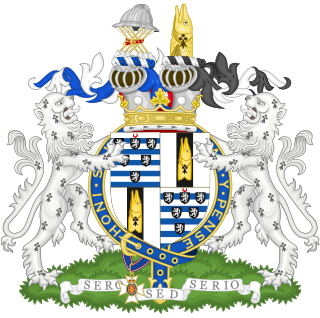
Marquess of Salisbury is a title in the Peerage of Great Britain. It was created in 1789 for the 7th Earl of Salisbury. Most of the holders of the title have been prominent in British political life over the last two centuries, particularly the 3rd Marquess, who served three times as Prime Minister in the late 19th and early 20th centuries.

The Peerage Act 1963 is an Act of the Parliament of the United Kingdom that permits women peeresses and all Scottish hereditary peers to sit in the House of Lords and allows newly inherited hereditary peerages to be disclaimed.

The House of Lords Act 1999 is an Act of the Parliament of the United Kingdom that reformed the House of Lords, one of the chambers of Parliament. The Act was given Royal Assent on 11 November 1999. For centuries, the House of Lords had included several hundred members who inherited their seats ; the Act removed such a right. However, as part of a compromise, the Act did permit ninety-two hereditary peers to remain in the House. Another ten were created life peers to enable them to remain in the House.

Earl of Haddington is a title in the Peerage of Scotland. It was created in 1627 for the noted Scottish lawyer and judge Thomas Hamilton, 1st Earl of Melrose. He was Lord President of the Court of Session from 1616 to 1625. Hamilton had already been created Lord Binning in 1613 and Lord Binning and Byres, in the County of Haddington, and Earl of Melrose, in the County of Roxburgh, in 1619. These titles were also in the Peerage of Scotland. The title of the earldom derived from the fact that he was in possession of much of the lands of the former Melrose Abbey. However, Hamilton was unhappy with this title and wished to replace it with "Haddington". In 1627 he relinquished the earldom of Melrose and was instead created Earl of Haddington, with the precedence of 1619 and with limitation to his heirs male bearing the surname of Hamilton. This derived from the fact that he considered it a greater honour to take his title from a county rather than from an abbey. Hamilton was a member of the prominent Scottish family of that name and descended from John de Hamilton, younger son of Walter de Hamilton, who was granted the feudal barony of Cadzow and who is also the ancestor of the Dukes of Hamilton and Dukes of Abercorn.

Archibald Gavin Hamilton, Baron Hamilton of Epsom, is a British Conservative Party politician. A member of the House of Lords, he served as Minister of State for the Armed Forces under John Major.
In the United Kingdom, life peers are appointed members of the peerage whose titles cannot be inherited, in contrast to hereditary peers. Life peers are appointed by the monarch on the advice of the prime minister. With the exception of the Dukedom of Edinburgh awarded for life to Prince Edward in 2023, all life peerages conferred since 2009 have been created under the Life Peerages Act 1958 with the rank of baron and entitle their holders to sit and vote in the House of Lords, presuming they meet qualifications such as age and citizenship. The legitimate children of a life peer appointed under the Life Peerages Act 1958 are entitled to style themselves with the prefix "The Honourable", although they cannot inherit the peerage itself. Prior to 2009, life peers of baronial rank could also be so created under the Appellate Jurisdiction Act 1876 for senior judges.

David John MacRae Carnegie, 14th Earl of Northesk, styled Lord Rosehill between 1975 and 1994, was a British hereditary peer, landowner and member of the House of Lords.

Anthony Paul Lester, Baron Lester of Herne Hill, QC was a British barrister and member of the House of Lords. He was at different times a member of the Labour Party, Social Democratic Party and the Liberal Democrats. Lester was best known for his influence on race relations legislation in the United Kingdom and as a founder-member of groups such as the Institute of Race Relations, the Campaign Against Racial Discrimination and the Runnymede Trust. Lester was also a prominent figure in promoting birth control and abortion through the Family Planning Association, particularly in Northern Ireland.
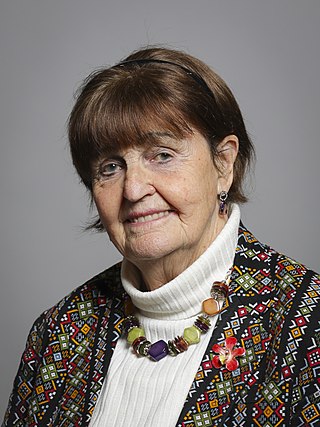
Caroline Anne Cox, Baroness Cox, is a cross-bench member of the British House of Lords. She is also the founder of an organisation called Humanitarian Aid Relief Trust (HART). Cox was created a Life Peer in 1982 and was a deputy speaker of the House of Lords from 1985 to 2005, as well as being a minister in government. She was also a Baroness-in-Waiting to Queen Elizabeth II. She was Founder Chancellor of Bournemouth University, Chancellor of Liverpool Hope University from 2006 to 2013, and is an Hon. Vice President of the Royal College of Nursing. She was a founder Trustee of MERLIN Medical Emergency Relief International.

Robert Antony Hayward, Baron Hayward, is a British Conservative Party politician and media commentator.
James Leslie Hamilton, 4th Baron Hamilton of Dalzell,, was a British Conservative Party hereditary peer.
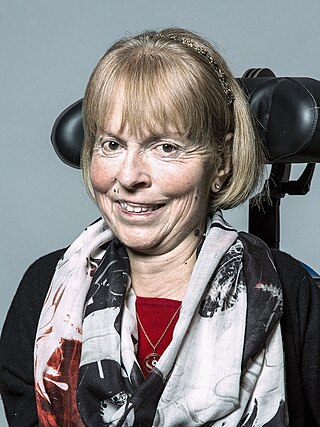
Jane Susan Campbell, Baroness Campbell of Surbiton, is a British disability rights campaigner and a life peer in the House of Lords. She was Commissioner of the Equality and Human Rights Commission (EHRC), and served as the Chair of the Disability Committee which led on to the EHRC Disability Programme. She was the former Chair of the Social Care Institute for Excellence (SCIE). She was a Commissioner at the Disability Rights Commission (DRC).

Christopher Holmes, Baron Holmes of Richmond,, is a British former swimmer and life peer in the House of Lords. He won a total of nine gold, five silver, and one bronze medal at the Paralympic Games. Holmes represented Great Britain at four Paralympic Games between 1988 and 2000 and is the only British Paralympic swimmer to win six gold medals at a single Games.

David Anthony Freud, Baron Freud, is a British politician, life peer, and former investment banker who served as Minister for Welfare Reform from 2010 to 2016. Before he joined the Conservative Party, he was vice-chairman of investment banking at UBS and a government adviser on welfare reform.
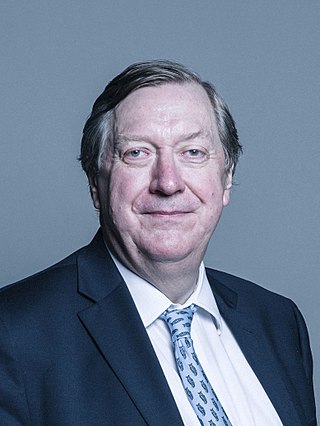
Geoffrey Robert James Borwick, 5th Baron Borwick, is a British businessman, hereditary peer and member of the House of Lords.

Thomas Henry Ashton, 4th Baron Ashton of Hyde,, has served as a Minister in HM Government since 2014 and by profession is an insurance broker. He succeeded to his family's peerage title on 2 August 2008.
Sir Herbert William Massie,, known as Bert Massie, was a British disability rights campaigner. He served as Chairman of the Disability Rights Commission from 2000 to 2007, and was a founding Commissioner of its successor the Equality and Human Rights Commission.
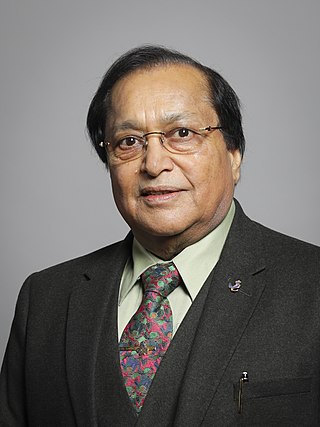
Raminder Singh Ranger, Baron Ranger, is a British businessman, and the founder of Sun Mark and Sea Air & Land Forwarding, an international marketing and distribution company. He is also chairman and managing director of Sea Air and Land Forwarding Ltd.

Andrew James Dunlop, Baron Dunlop is a British politician and life peer. From May 2015 to June 2017, he was the Under-Secretary of State for Scotland and Northern Ireland. He sits in the House of Lords on the Conservative benches.
References
- ↑ 'SHINKWIN', Who's Who 2017 , A & C Black, an imprint of Bloomsbury Publishing plc, 2017; online edn, Oxford University Press, 2016; online edn, Nov 2016 accessed 16 Oct 2017
- ↑ "Armed Forces Covenant recognised in law for first time – Announcements". Government of the United Kingdom. Retrieved 23 April 2016.
- ↑ "Case study: Royal British Legion – "Leave it out Ken"" (PDF). Archived from the original (PDF) on 9 May 2016. Retrieved 23 April 2016.
- ↑ "New Commissioner for the Equality and Human Rights Commission" . Retrieved 22 April 2017.
- ↑ "Anti-abortion activist resigns as Equality and Human Rights Commissioner". Humanists UK. Humanists UK. 13 December 2017. Retrieved 14 December 2017.
- ↑ "No. 61385". The London Gazette . 20 October 2015. p. 19670.
- ↑ "Introduction: Lord Shinkwin". Parliamentary Debates (Hansard) . House of Lords. 17 November 2015.
- ↑ "Dissolution Peerages 2015". Government of the United Kingdom. Retrieved 27 August 2015.
- ↑ "House of Lords: Outcry as donors, fixers and MPs caught up in expenses scandal are handed peerages". The Independent . Retrieved 28 August 2015.
- ↑ "Members of the House of Lords: Lord Shinkwin". Parliament of the United Kingdom. Retrieved 16 October 2017.
- ↑ Hughes, Laura (10 March 2017). "Tory peer Lord Shinkwin warns Britain's abortion laws are a 'licence to kill disabled people'". The Telegraph.
- ↑ "Disability Must Stop Being Workplace D&I's Poor Relation, Says Disabled Conservative Peer". Forbes . Retrieved 13 November 2023.